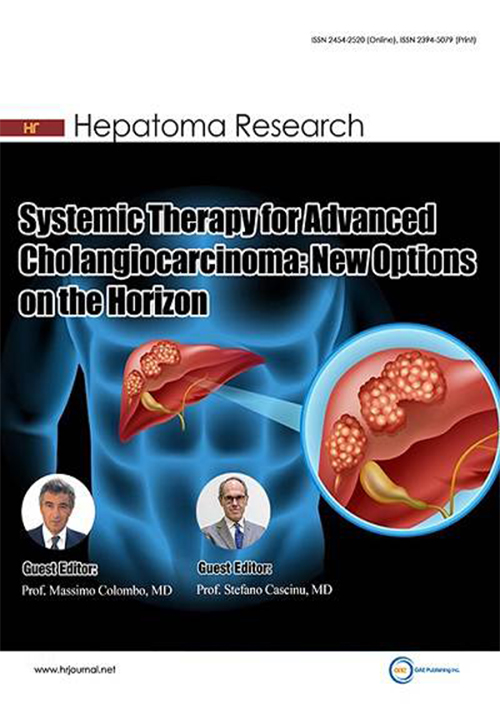
Topic: Systemic Therapy for Advanced Cholangiocarcinoma: New Options on the Horizon
A Special Topic of Hepatoma Research
ISSN 2454-2520 (Online) 2394-5079 (Print)
Submission deadline: 15 Mar 2023
Guest Editors
Massimo Colombo, MD
Chairman of the EASL International Liver Foundation, Geneva, Switzerland.
Director of the Liver Center, San Raffaele Hospital, Milan, Italy.
Director of the Liver Center, San Raffaele Hospital, Milan, Italy.
Special Topic Introduction
Special Issue webinar: https://www.oaepublish.com/webinars/hr.186
Cholangiocarcinoma (CCA) is the second most common primary hepatic malignancy after hepatocellular carcinoma, representing approximately 15% of all primary cancers of the liver. With all the caveats of a misclassification that may have occurred in the years when iCCA was not coded separately from extra-hepatic CCA, the incidence of CCA has been soaring globally, in part paralleling the increasing burden of chronic liver diseases. The tumor is notable for a number of peculiarities which include a remarkable propensity to evade early diagnosis and defy treatment, not to speak of its well recognized epidemiological, anatomical and biological heterogeneity. In consequence of its clinical aggressiveness, limited treatment options and high rates of recurrence after resection, this cancer displays one of the highest mortality-to-incidence ratio of any solid neoplasm. While the tumor is classified into three anatomical subtypes, intra-hepatic (iCCA, 20% of all CCAs), peri hilar and distal tumor, each of these subtypes is associated to different risk factors, from cirrhosis to flukes and bile duct stones, and has different clinical trajectories, all in the context of a significant geographic variability. The fact that the majority of CCAs have a sporadic onset, has important clinical consequences, one above all the lack of screening causing detection of most biliary tumors at an advanced stage. Notably, in the frame of such a remarkable clinical heterogeneity, the neoplastic biliary epithelium evolves a myriad of genetic and epigenetic changes that have been thoroughly investigated as potential markers for developing precision medicine based treatments. Yet, none of these genetic markers has proven to help early diagnosis, the only pragmatic approach to override the dismal prognosis of CCA. All in all, a better understanding of the concerned risk factors and the identification of those molecular stigmas that have pathogenic relevance, might have ground breaking clinical consequences in the direction of a precision medicine oriented management of patients with CCA.
Proposed papers:
1. Epidemiology of CCA.
2. Pathology and Molecular pathology.
3. Immunology of cholangiocarcinoma.
4. Early detection and screening in high risk population.
5. Radiological imaging and non-surgical local treatments.
6. Surgical management of CCA.
7. Liver transplantation.
8. The neoadjuvant/adjuvant treatments.
9. Treatment of advanced disease: from chemotherapy to targeted agents.
10. Conclusions.
Participants
1. Carlo La Vecchia, Department of Clinical Sciences and Community Health, Università degli Studi di Milano, Milan, Italy .2. Francesco De Cobelli, Clinical and Experimental Radiology Unit, Experimental Imaging Center, IRCCS San Raffaele Scientific Institute, Milan, Italy.
3. Timothy M. Pawlik, Department of Surgery, The Urban Meyer III and Shelley Meyer Chair for Cancer Research, The Ohio State University Wexner Medical Center, Columbus, OH, USA.
4. Luca Aldrighetti, Hepatobiliary and General Surgery Division, San Raffaele Hospital, Milan, Italy.
5. Federica Pedica, Pathology Unit, San Raffaele Scientific Institute, Milan, Italy.
6. Chiara Braconi, Division of Cancer Therapeutics, The Institute of Cancer Research, London, UK.
7. Nigel Heaton, Institute of Liver Studies, King's College Hospital & King's College London, London, UK.
8. Alejandro Forner, Barcelona Clinic Liver Cancer (BCLC) Group, Liver Unit. Hospital Clinic Barcelona, IDIBAPS, Fundació Clinic, University of Barcelona, Barcelona, Spain.
9. Stefano Cascinu, Unit of Oncology, IRCCS San Raffaele Scientific Institute, Milan, Italy.
10. Mario Strazzabosco, International Center for Digestive Health (ICDH), University of Milan-Bicocca, Milan, Italy.
11. Jennifer J. Knox, Princess Margaret Cancer Centre, Toronto, Ontario, Canada.
The list is arranged in no particular order and to be updated.
Submission Deadline
15 Mar 2023
Submission Information
For Author Instructions, please refer to https://www.oaepublish.com/hr/author_instructions
For Online Submission, please login at https://www.oaecenter.com/login?JournalId=hr&IssueId=hr230315522
Submission Deadline: 15 Mar 2023
Contacts: Victoria Lee, Assistant Editor, [email protected]








